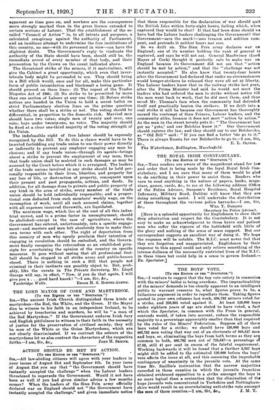THE BOYS' VOTE.
[To THE EDITOR OP THE " SPECTATOR."3 SIR,-1 venture to suggest that the boy vote outcry in connexion with the miners' ballot is being overdone. The impracticability of the miners' demands is too clearly apparent to an intelligent public to warrant resource to, what figures prove .to be, a fallacious argument in order to repudiate them. Taking figures quoted in your own columns last week, 606,782 miners voted for a strike, and 238,865 voted against it. At least 120,000 boys under eighteen years of age are stated to have voted, a fact which the Spectator, in common with the Press in general. contends would, if -taken into account, reduce the responsible majority to a percentage appreciably smaller than that required by the rules of the Miners' Federation. Suppose all of these boys voted for a strike; we should have 120,000 boys and 486,782 men voting that way out of an electorate of 845,647 men and boys, or, eliminating the boys from both terms as they are common to both, 486,782 men out of 725,647—a percentage of 67.08, still 41 per cent in excess of the fateful requirement. Working backwards it will be found that a further 2,957 boys might still be added to the estimated 120,000 before the boys' vote affects the issue at all, and this assuming the improbable contingency of unanimity in the juvenile vote. At the same time Mr. Smillie's insinuation that the narrow majoritiee recorded in those counties in which the juvenile franchise obtained evidenced opposition to a strike amongst the boys is no more logical than a contention that the elimination of the huge juvenile vote concentrated in Yorkshire and Nottingham. shire would result in an overwhelming anti-strike vote amongst the men of those counties.—I am, Sir, &c., I. M. T.


































 Previous page
Previous page